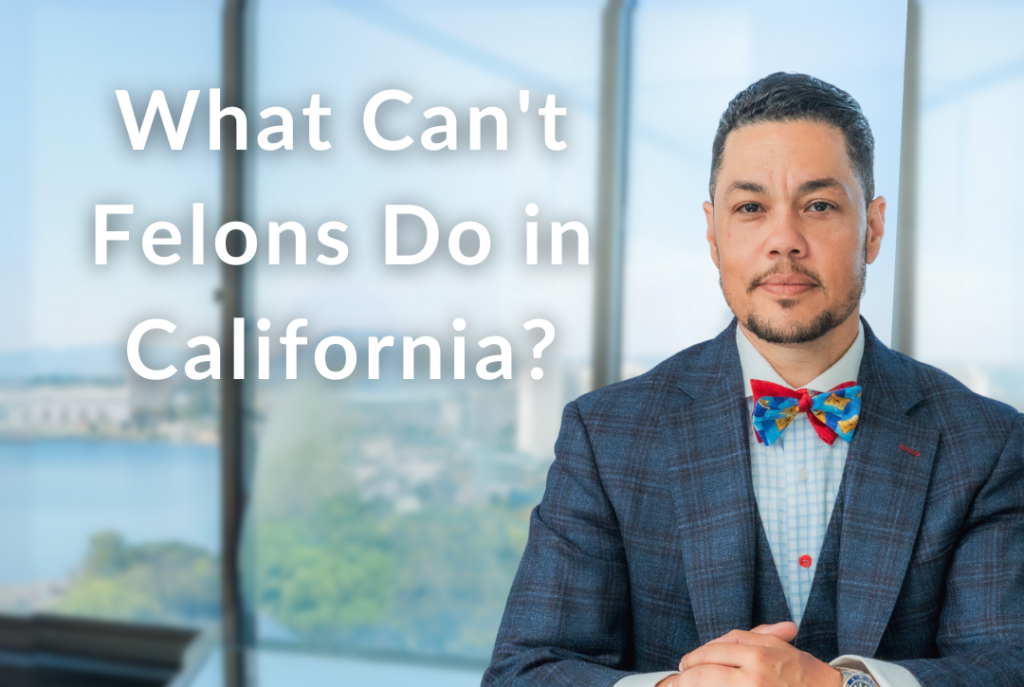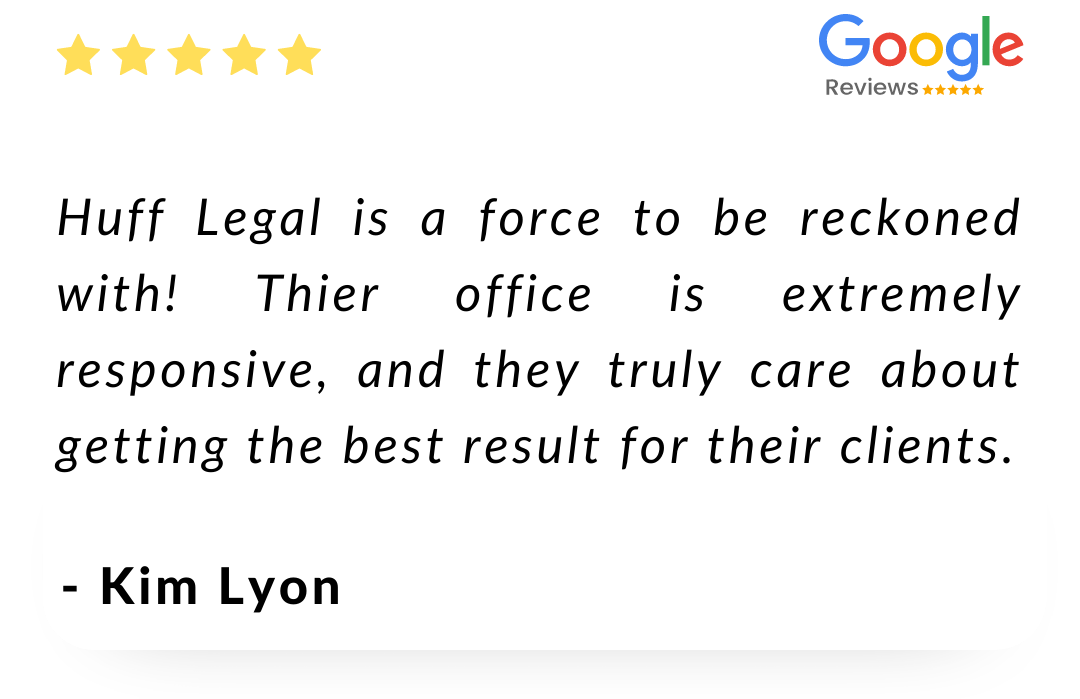What Can't Felons Do in California?
What Can't Felons Do in California?
A felony conviction in California leads to the loss of critical rights. Felons cannot vote, serve on a jury or own firearms. Employment opportunities may also be limited, and traveling abroad becomes more difficult.
California does not have as many restrictions on convicts’ constitutional rights as other states. Unfortunately, the state still imposes numerous limitations on what convicted felons may and cannot do, such as preventing them from serving on juries or owning firearms.
However, many of these restrictions can be reversed. This article will explain what felons can’t do in California and how some rights can be restored.
Loss of Rights After a Felony Conviction
A felony conviction in California results in the loss of specific rights that directly impact your daily life. These include:
Voting Rights
If you are convicted of a felony in California, your right to vote is suspended while you are in state prison or on parole. Once you complete your sentence and parole, your voting rights are automatically restored, but you will need to re-register to vote.
Gun Ownership
Felons in California face a lifetime ban on owning or possessing firearms. This ban applies to both state and federal felonies, and expunging a conviction does not restore gun rights. In some cases, individuals may petition to restore these rights, but this is only possible for certain offenses.
Jury Service
Felons are disqualified from serving on a jury in California unless their civil rights have been restored. This restoration can occur through a Certificate of Rehabilitation or a Governor’s Pardon, but without this, felons are not eligible for jury duty.
Employment Opportunities
A felony conviction can severely limit job prospects. Some professions, including law enforcement, healthcare, and education, may be off-limits to felons due to restrictions on obtaining the required licenses. Employers are also allowed to consider felony convictions during background checks.
Traveling Abroad
Travel restrictions are common for felons, especially while on parole or probation. Some countries, such as Canada, may refuse entry to individuals with a felony record. Permission from a parole officer is often required for travel, even within the U.S., during a supervised release period.
Public Assistance and Housing
Felons may face barriers to obtaining public assistance, such as housing benefits or welfare programs. Housing restrictions, especially for those with drug-related or violent convictions, can make finding a place to live challenging, as public housing authorities may deny felons residency.
Parental Rights
A felony conviction can affect parental rights, especially if the conviction involves violence or endangerment. Courts may limit or revoke a felon’s custody or visitation rights, and the restoration of these rights often requires legal intervention and proof of rehabilitation.
Request a Free Consultation
What Can't Felons Do: Restrictions Based on Felony Convictions
In addition to the loss of certain rights, felons face specific restrictions depending on the type of conviction.
Can Felons Serve in the Military?
A felony conviction typically disqualifies someone from enlisting in the U.S. Armed Forces. In rare cases, a waiver from the Secretary of Defense may allow for enlistment, but these waivers are difficult to obtain.
Can Felons Visit Other Countries?
Many countries, such as Canada and Australia, impose strict restrictions on felons entering their borders. Felons may need to apply for a special permit or waiver to travel abroad, a process that can take several months and is not guaranteed.
Can Felons Get Public Assistance in California?
Some felons, particularly those convicted of drug offenses, may be ineligible for public assistance programs in California. However, individuals who complete drug treatment programs or show rehabilitation may regain access to certain benefits.
Regaining Rights After a Felony Conviction
After a felony conviction, some rights can be restored through legal processes. However, the extent and method for restoration depend on the rights in question and the severity of the felony.
How to Restore Voting Rights
In California, your voting rights are automatically restored once you complete your prison sentence and parole. To vote again, you must re-register to participate in elections. This is a straightforward process and does not require a court petition.
Restoring Gun Rights After a Felony
Restoring gun rights is much more challenging. Felons are typically permanently banned from owning firearms. However, if convicted of a “wobbler” offense, you may be able to petition the court to reduce the charge to a misdemeanor, which could restore your gun rights. For more serious offenses, only a Governor’s Pardon can restore firearm ownership.
Expunging a Felony Conviction
Expunging a felony conviction helps clear your record but doesn’t erase it entirely. An expunged record still exists, but it can make obtaining employment and housing easier. It’s important to note that expungement does not restore all lost rights, such as gun ownership.
Applying for a Pardon in California
A Governor’s Pardon is one of the most comprehensive ways to regain rights. It can restore rights like owning a firearm and serving on a jury. You must demonstrate good behavior and a crime-free life for at least 10 years after your sentence to be considered.

As Seen On












How Long Do Felonies Stay on Your Record?
Felonies stay on your record permanently unless expunged. Expungement removes the conviction from public view, but the record is still accessible by certain government agencies. This can impact job prospects, housing, and other opportunities. Expungement is a key step toward moving forward after a felony conviction.
FAQ
What rights do felons lose in the United States?
Felons typically lose the right to vote, own firearms, and serve on a jury. Some states allow the restoration of these rights after completing their sentence or through legal processes like pardons.
What are the downsides of being a felon?
Being a felon can result in restricted employment opportunities, difficulty in finding housing, and the loss of civil rights like voting and gun ownership. Felons may also face social stigma and travel restrictions.
How does having a felony affect your life?
A felony conviction can significantly impact your life, including job discrimination, difficulty accessing loans or public assistance, and long-term legal restrictions. Some rights can be restored, but the process is often lengthy.
Can felons join the military?
Felons are generally disqualified from joining the military, but a waiver from the Secretary of Defense may allow some individuals to enlist under certain circumstances. However, these waivers are rare and typically hard to obtain.
What Clients Say About Us





Schedule Your Free Consultation Today
Take Control of Your Future—Regain Your Rights with Huff Legal
Understanding the rights you lose after a felony conviction is crucial for planning your future. While these restrictions can be significant, many can be restored with the right legal steps.
Contact Huff Legal today for expert guidance on regaining your rights. Whether you’re seeking to delete a record, restore voting rights, or navigate other legal hurdles, our experienced attorneys are here to help.
LET HUFF HELP YOU
As a former police officer and patrol supervisor and his time spent as a United States District Court Judicial Law Clerk to the Chief Judge, Attorney Huff knows how to navigate all levels of the complex criminal law system. We also have more than 55 years of combined experience dealing with various complex criminal legal matters and have helped just over 1,500 clients over the past few years.
Why Huff Is Your Best Option For Criminal Defense
55+ Years of Combined Experience
At Huff Legal, we have more than 55 years of combined experience dealing with complex criminal legal matters, which can oftentimes be quite challenging. In order to get the outcome you deserve, you need a team of experienced attorneys on your side, who can help you navigate the legal system, so you can move past this situation and focus on the life ahead of you!
5 Star Rating on Google
We have a proven track record of success and are dedicated to our clients’ best interests. If you’re looking for a law firm that will always have your back, look no further than Huff Legal. Just have a look at some of our amazing client reviews over here!
1,500+ Happy Clients
Over the years, we’ve had the privilege of helping over 1,500 clients with their legal needs. When you work with us, you can be confident that you’re getting the best possible legal representation. We’re proud of our track record and our reputation for being a firm that delivers great results.
What Our Clients Say About Us


Sheila


Abel Resendiz


Manuela Frazier


Doris
Contact Huff Today
Request A Free Consultation
* Free consultations only available for Criminal Defense


In legal terms, an accessory to murder refers to an individual who aids, abets, or otherwise assists in committing a murder. While the specifics may vary across jurisdictions, California law treats accessories to murder as active participants in the crime, holding them accountable for their actions. In San Francisco Bay Area, there are two primary types of accessories to murder:
In the event that you find yourself in the Bay Area facing accessory to murder charges, you should first call a criminal defense attorney who can help you defend your rights and lessen the effects of the investigation. Contact an attorney at Huff Legal as soon as possible following your arrest. An accomplished attorney from Huff Legal will thoroughly examine your case, who will then develop a strategy and build a defense.
